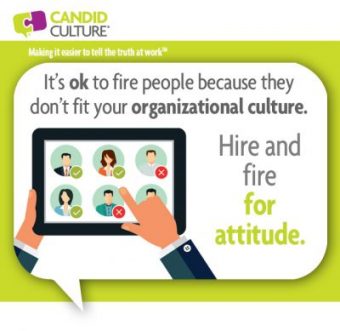“He does great work but is really difficult to work with.” “She produces great results at the expense of people.” I hear these complaints all the time. I feel like people need permission to hire and fire because of fit. So here it is, it’s ok to hire and fire people who don’t fit your culture. You can find people who do great work and who interact according to your company’s values, and you deserve to have both.

Results are often considered more important than the seemingly ‘softer stuff,’ how people got those results. And it often doesn’t feel legitimate to want to get rid of an employee who treats coworkers poorly. We question ourselves thinking, “Maybe it’s not that bad? Perhaps I’m being too sensitive?” Or, “He does great work and is really reliable. Maybe I need to get over that he throws me under the bus in meetings I don’t attend?” “It’s really hard to find and keep good, reliable, employees. I should just suck it up.”
What if employees who treat coworkers and direct reports poorly or don’t practice your organizational values aren’t good employees? People don’t want to work for a manager who is knowledgeable but mistreats people. And likewise, people don’t want to work with people who are super friendly but do no work.
Some organizations evaluate employees both on the results they achieve and how they get to those results. That makes perfect sense.
Here are six tips for hiring and firing employees for fit:
- Share your organizational values and behavior practices overtly when you interview candidates. Make it clear that people who don’t follow those practices won’t be happy or successful in the organization.
- Create an opportunity for candidates to do an extended practical interview, during which they can get a feel for what the culture is really like, outside of a formal sit-down interview. Then give candidates an opportunity to opt-out of a job because they didn’t feel they fit in during the practical interview.
- Trust yourself. If you find it off putting that a coworker raises her voice at you, gossips about you, or takes credit for your work, trust yourself.
- Set clear expectations around how employees, coworkers, vendors, and customers are expected to behave when doing business with your organization. And be willing to let internal and external customers and suppliers go because they aren’t willing or able to follow your behavioral practices.
- Coach and give feedback on how people achieve results.
- Let employees go who don’t respond to feedback on interpersonal behaviors. Or let them know it’s time for them to look elsewhere.
Suffering at work is optional. You deserve to work with people who reflect your organization’s values.
The post Hire and Fire for Attitude – Hiring Employees appeared first on Shari Harley.


















